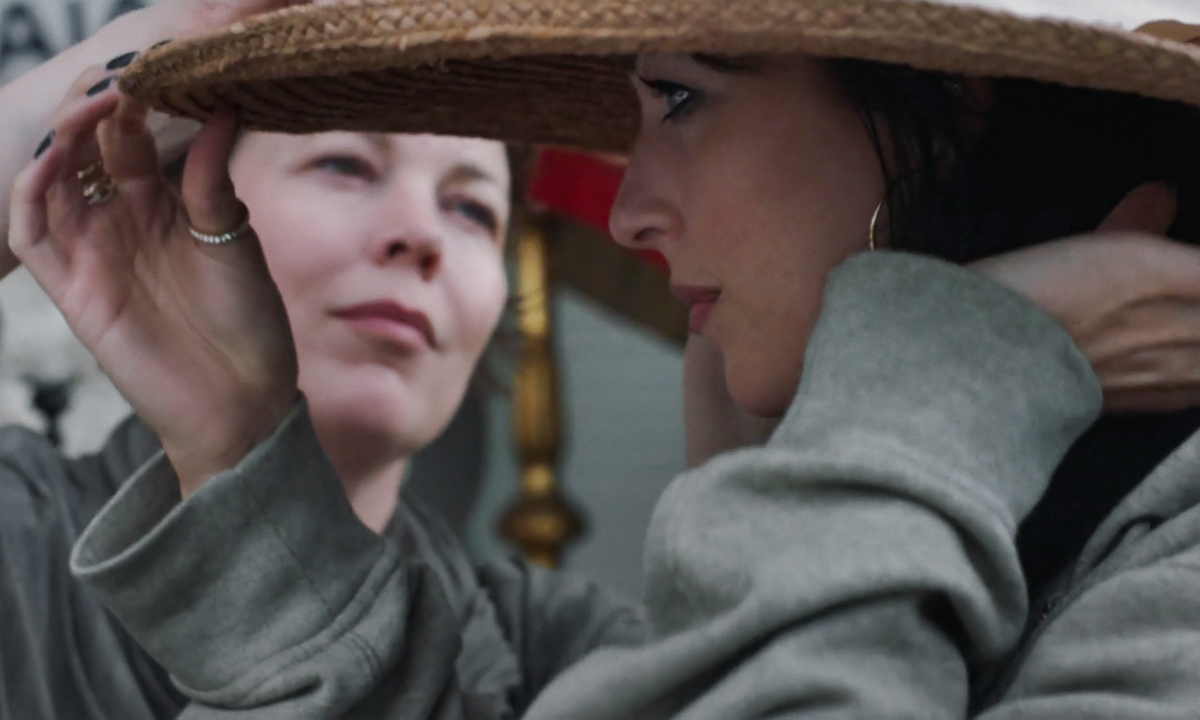Maggie Gyllenhaal’s stunning debut highlights the harrowing responsibility that comes with motherhood
The Lost Daughter, director Maggie Gyllenhaal’s brilliant debut, follows troubled main character Leda Caruso, both in present day (Olivia Colman) and 20 years prior (Jessie Buckley). On a vacation in a small Greek town, Leda meets a handful of quirky characters, but soon finds herself drawn to Nina (Dakota Johnson) and her daughter. As a quick glance over at Nina soon manifests into something bordering on obsession, Leda can’t help but think of her own life and her children when she interacts with Nina. Viewers are soon taken on a journey that jumps between the past and present, offering tidbits of information regarding what exactly Leda is so haunted by every time she looks at Nina and her young daughter.
The overall ambience of this film is creepy — but not in the ways you would expect. There are moments, such as the scene where a massive bug flies into Leda’s bedroom and settles on the pillow next to her in bed, that are nightmarish. While nothing majorly distressing happens, there is a constant air of anticipation that lingers throughout the film. Viewers are waiting for something to happen, something more than the small albeit unnerving occurrences that are scattered throughout the film. These off-putting moments, such as Leda’s near-panic attack at the toy store, her constant dizzy spells, and the glares she receives from Nina’s family, may leave viewers unsatisfied, especially those seeking a climax resulting in violence or the like. But these small moments appear to play an important role in portraying Leda’s current headspace, which is, to say the least, detached and ridden with anguish.
Leda is the full package in terms of character complexity: she is a troubled mother who is relatable, at times detestable, and (more often than not) hilarious at the most inappropriate times. Colman fans who thoroughly enjoyed the actress’s role as the haughty godmother in Fleabag will resonate with the older Leda, especially for her sharp quips. Buckley delivers an equally memorable performance as a young mother who is attempting to juggle both a career in academia and the needs of her two young daughters. While Colman and Buckley are the obvious stars of the film, viewers certainly shouldn’t discount Johnson’s performance as the sensual, overwhelmed young mother who displays eerie similarities to Leda. While Nina doesn’t offer a lot of thought-provoking dialogue, her body language and enigmatic stare somehow manage to compensate for this.
Overall, this film confronts the reality of exhausted mothers who are on the brink of a breakdown, and instead of sugarcoating it by offering a happy ending where past faults are reconciled, the ending is left open to interpretation. Somehow, this uncertainty lends itself beautifully to the final scene, where Leda is seen, once again, on the same beach as is shown in the beginning.
What makes this narrative truly noteworthy is its refusal to redeem (and even explain) Leda’s poor choices. Instead, it offers a space for troubled characters to be vulnerable without imposing a message of morality. These characters are purposefully messy, just as messy as life itself is. Motherhood assumes many different forms, and this film pays special attention in highlighting the complex nature of being a caregiver. It takes into account both the rewards and the difficulties of having children, though definitely focusing more on the latter.
At the end of the day, The Lost Daughter will leave you with more questions than answers. The audience doesn’t necessarily receive a cut and dry explanation regarding why certain characters act the way they do, and that’s the point; we’re left to sit with these odd, imperfect people and simply allow their stories to unfold, for better or for worse.
Visuals by Catherine Reynolds
